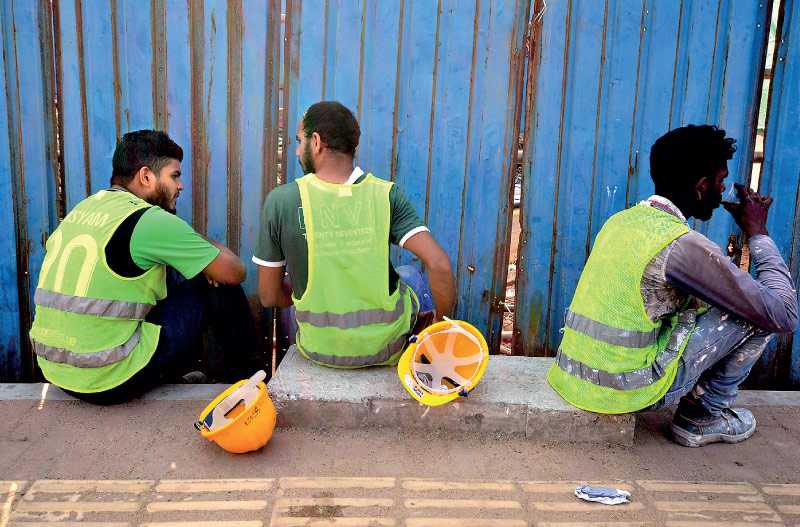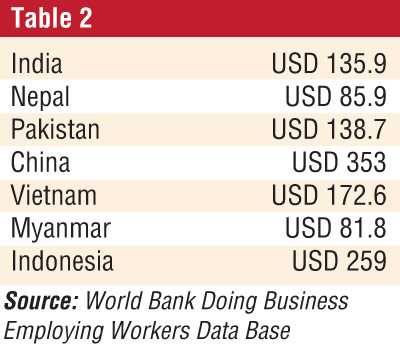Sunday Feb 22, 2026
Sunday Feb 22, 2026
Wednesday, 3 March 2021 23:54 - - {{hitsCtrl.values.hits}}

Such a wage should provide workers with an income sufficient not merely for bare physical subsistence, but also for a measure of frugal comfort and for maintenance of health at levels which support efficiency at work, and some assurance of being able to deal with the more important misfortunes of life – Pic by Shehan Gunasekara

By T.M.R. Rasseedin
The enactment of the National Minimum Wage Act No. 3 (NMWA) of 2016 had a long history of
agitation by trade unions for a floor wage, taking into consideration the economic difficulties of
workers, especially of the lower rungs. Before the NMWA was passed into law, trade unions
including the Ceylon Federation of Labour (CFL) challenged it before the Supreme Court on the
grounds that its provisions were iniquitous and in conflict with the constitution.
The action was dismissed by a bench headed by Justice Sri Pavan on a frivolous technical issue that the petitioners had not made declarations that their members were citizens of Sri Lanka! However, the long agitation by trade unions bore fruit and a national minimum wage is now firmly established – in principle at least. The CFL believes that the effective implementation of a just minimum wage would bring tremendous benefits to the unorganised, informal, casual voiceless section of the working class. This would be of considerable social and political significance as well as having direct implications for the labour market.
The NMWA defined the minimum amount an employer is bound to pay for the services of labour at the lower end of the labour market. The demand of the unions at that time was for a floor wage of Rs. 15,000. The free play of market forces in an economy such as ours can become highly exploitative for workers in terms of their remuneration. A minimum wage provides a means of reducing poverty by guaranteeing a minimum income for the worker.
The CFL firmly believes in the concept of a minimum wage as the minimum wage to which a worker is entitled. It should be available for all workers not only in words but also in deed. It should not be restricted to a particular work/category/sector, but be established as a fundamental right of the entire working people. The NMWA of 2016 does not itself define the concept of the minimum wage. The ILO defines minimum wage as the minimum amount of remuneration that an employer is required to pay wage earners for the work performed during a given period, a wage that cannot be reduced by Collective Agreement or individual contracts.
It is our considered opinion, the minimum wage of Rs. 10,000 fixed by the NMWA in
2016 amounted to a minimum subsistence level wage and not one at sustenance level, that is, not a wage adequate enough to live. With the outbreak of the pandemic, the already significant number of working poor in the country has been mounting. This situation has been brought about due to the ill-conceived decisions of a so-called Labour Task Force with the support of a trade union rump that contributed to this situation by placing a significant number of workers in the private sector with neither work nor due wages during the present crisis.
With this background in mind, we believe that in its deliberations on reviewing the NMWA the Cabinet Sub-committee should focus on establishing an adequate minimum wage, a wage sufficient to ensure that every worker is provided with basic necessities of life and a reasonable standard of living. Such a wage should provide workers with an income sufficient not merely for bare physical subsistence, but also for a measure of frugal comfort and for maintenance of health at levels which support efficiency at work, and some assurance of being able to deal with the more important misfortunes of life.
In this regard we wish to urge you to consult the Department of Census and Statistics, their Household Income and Expenditure Survey (HIES) and Wage Adjustments recommended to meet increases in cost of living. According to the latest findings of the HIES a family of four requires Rs. 54,500 monthly to meet its expenses.
The national minimum wage at present amounts to Rs. 13,500, made up as shown in Table 1.
However, employees covered by collective agreements are not entitled to provisions of the Act. From the above, it is clear that a worker on minimum wage today suffers a shortfall of Rs. 41,500 in the earnings necessary to support his or her family. A strategy must be devised to overcome this shortfall to enable the worker to make ends meet as increases in living costs continue to erode the real wages he or she receives. It has also to be pointed out that Sri Lanka’s minimum wage of $ 68.70 is the lowest in the region. The minimum wage as determined by our neighbours is well above this sum as shown in Table 2.
Although the World Bank database is believed to serve as a guide for investors, Sri Lanka’s with its low minimum wage of $ 68.70 has underperformed the above countries with much higher minimum wages in attracting foreign direct investment (FDI), thus blowing off the oft-quoted myth that high labour costs deter FDI.
It should also be mentioned that some of the countries mentioned above have coupled their minimum wage to the lowest wage paid in the public sector. In Sri Lanka, the minimum starting salary in the public sector approximates to Rs. 31,876. Our much lower minimum wage combined with the continued depreciation of the rupee and soaring inflation indicate the need for urgent relief for these workers. We trust your endeavours will lead to a substantial revision of the present minimum wage and provide workers with meaningful relief.
The previous Government presented a bill to Parliament before dissolution incorporating an increase of Rs. 2,500, although this too was felt by trade unions to be too low. The onus to review and revise the National Minimum Wage Act of 2016 now lies with the Cabinet Sub-committee and we trust the Committee would give due consideration to the case we have made and decide in favour of a substantial increase in the present minimum wage rate.
(The writer is the General Secretary, Ceylon Federation of Labour (CFL).)